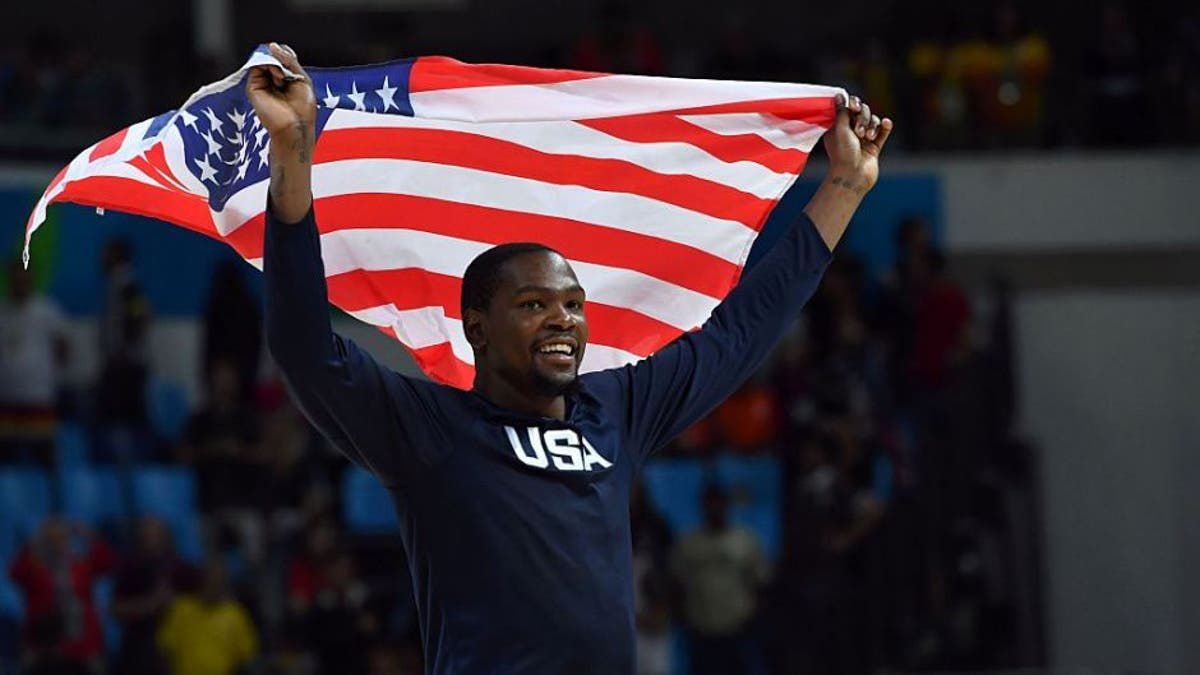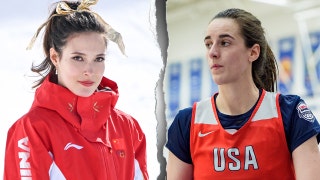
USA's guard Kevin Durant celebrates with USA's flag after defeating Serbia during a Men's Gold medal basketball match between Serbia and USA at the Carioca Arena 1 in Rio de Janeiro on August 21, 2016 during the Rio 2016 Olympic Games. / AFP / Andrej ISAKOVIC (Photo credit should read ANDREJ ISAKOVIC/AFP/Getty Images)
"What you smiling about?"
"Dude, I almost had you."
"You almost had me? You never had me. You never had your car."
Remember when Brian O'Conner thought losing to Dom Toretto at the wire in the original The Fast and the Furious movie was actually worth something?
Remember when O'Conner was granny-shifting around turn four?
Remember when Team USA basketball almost lost to Serbia and Australia during pool play and was a program "on the decline"?
No. No one does. Nobody cares. Because in basketball, like in ludicrous, fictional street racing, it doesn't matter if you win by an inch or a mile -- winning is winning.
There will be plenty of pundits out there who will critique every little thing the United States did wrong en route to their 96-66 gold medal beat down over Serbia on Sunday, but let's not act like the "ugly wins" or lack of "style points" are going to make Team USA feel enough shame to take said medals from around their necks and return them to the IOC.
They didn't run a fundamentally-sound flex offense with Princeton cuts and elevator doors off-ball screens; as a matter of fact, the US didn't really run any resemblance of an offense set at all. Instead, they played a brand of basketball that essentially translated to: "We're individual superstars, the best in the world, and we're going to prove that to you right now."
And you know what? That's completely fine, because no basketball team -- whether it's AAU, high school, college, or the pro level -- is ever under any obligation to 'impress' and cater to what the viewers want to see. They are under the obligation to win -- and Team USA did just that.
What does it all mean? Here's what we learned from the United States' Olympic campaign in Rio de Janeiro this summer, using only Dom Toretto quotes as prompts:
"I live my life a quarter mile at a time. Nothing else matters: not the mortgage, not the store, not my team and all their bulls**t. For those ten seconds or less, I'm free."
We learned that the best Carmelo Anthony is Olympic Carmelo Anthony. Despite a short stretch of shooting struggles during the games vs. France and Spain, Melo proved once again that he is not only the world's most dominant FIBA player, but, the most decorated US basketball Olympian ever with three gold medals to his name -- more than anyone in the history of Team USA.
Olympic basketball is Anthony's quarter mile. For these two weeks during the summer every four years, he is free.
Away from the daunting New York City expectations, media and public pressure -- Melo's offensive talents evolve to juggernaut status when he is complemented by teammates who are as good as he is, if not better.
During the NBA season, opposing defenses have the luxury of surrounding him like the Germans did to the 101st Airborne division at the Battle of the Bulge -- mainly because the Knicks' supporting cast has been the NBA equivalent of the smell that lingers in the office bathroom an hour after everyone gets back from Taco Tuesday.
On Team USA, with so many scoring threats present on the court at the same time, Anthony feasts on the one poor soul who is assigned to defend him, and easily accomplishes what he was put on the planet to do -- get buckets.
He may not be the best player in the league, he may never win a championship, his game may have significant flaws on both sides of the ball -- but these 2016 Olympics proved, once again, that if Carmelo Anthony is your secondary scoring option and isn't required to assume the responsibilities of "making everyone better" as the team's best player...
...you are not going to lose.
"I used to drag here back in high school. That railroad crossing up there is exactly a quarter-mile away from here. On green, I'm going for it."
We learned that Kyrie Irving is Kyrie Irving and there is nothing you can do stop it.
"He's a point guard, not a pass guard." ... "He doesn't make his teammates better." ... "He dribbles too much." ... "He takes bad shots." ... You name it, someone out there has likely said it this year in an attempt to constructively criticize or dismiss Irving's greatness.
Whether it was his contested stepback three to put the Cavaliers in front for good during Game 7 of the NBA Finals, or, a similar isolation showcase to seal the victory vs. Australia during the preliminary rounds -- Irving is the basketball equivalent of Toretto drag racing a train and trying to beat it across the tracks. You can ride with him, alongside him or behind him -- but do not try to stop him because you're just going to piss him off and make the situation more dangerous.
What does that mean? It translates to the fact that Kyrie, now more than ever, is a man on a mission who just so happens to be simultaneously driving the best car (the Cavs).
He is the most creative scoring guard in the league; and before you flood the comment section with petitions for Steph Curry, no one ... and I mean no one ... has the dribbling AND finishing ability in traffic like Irving. After this Olympics, Kyrie is the yin to Steph's yang.
While Steph's prominence can be attributed to the mastery of "finesse," Irving is the perfect combination of power and creativity. His AND1 Mixtape-esque handles make you want to find the nearest white towel and start waving it around your head in a helicopter motion as you run laps around your living room screaming for joy, as if you just got the 3AM "You up?" text from that ex you still haven't gotten over.
The layups he converted this season in the NBA and during the Olympics are nothing short of unfathomable. The angles he attempts them at should be geometrically impossible, yet, he makes them regularly like it's absolutely nothing.
That's the point here. Kyrie is never going to stop taking these shots and/or refrain from trying to cross you and your entire family into another galaxy. He's simply too good at it; and the sooner you realize that, the sooner you will come to peace with what Irving is -- a once-in-a-generation talent that doesn't need to "improve" so much as he needs to be "unleashed."
"You can have any brew you want... as long as it's a Corona."
We learned that even in the most pristine of circumstances, DeMarcus Cousins cannot be fixed. If he's on the court, you can ask for any flavor of Cousins you want -- as long as it's Boogie.
For those new to the DeMarcus Cousins experience, "Boogie" pertains to Cousins' erratic, destructive, schizophrenic alter ego that seems to be the one thing holding him back from being the best center in basketball.
Every two steps he takes forward, Boogie takes two back. Whether it's his "my aces just got busted by a 7-2 off-suit" emotional tilt he goes on when a call doesn't go his way, his inability to stay out of foul trouble in any environment (he fouled out in NINE minutes of play during a 44-point blowout vs. Venezuela, lost his starting job to DeAndre Jordan, and played just 10:42 in the semifinal game vs. Spain), or his general mindset of "well now I have to make up for all the time I missed sitting on the bench, time to YOLO and launch this contested twenty-footer!" on offense -- Cousins is, has always been and may always be the biggest "What if..." in professional basketball.
Even Cousins' superior, Vlade Divac, who is the Sacramento Kings' Vice President and General Manager of Basketball Operations, told The Sacramento Bee last week:
""In the international game, there is a lot of dirty stuff ... It's very different from the NBA. It's almost like there is a different set of rules. Against someone like DeMarcus, who has all this talent, teams are going to try all the tricks to stop him. But he has to learn to play through it. He can't react."
Team USA was an opportunity for DeMarcus Cousins to prove: "Hey, if I'm not in Sacramento -- The Shawshank Redemption 'Hole' of the NBA -- my act will change and I will be the consistent, overwhelming, dominating big man I'm supposed to be!"
Nope, give him just a smidgen of privilege and before you know it he's locked the door, put "Sull'aria Che soave zeffiretto" from Mozart's Marriage of Figaro on the prison PA system at max volume, and is smiling at the warden through the window with an "I just pooped in your shoes" grin on his face.
"Brian Earl Spilner. Sounds like a serial killer. Is that what you are? Don't come around here again."
We learned that we don't know who Draymond Green really is.
After two straight NBA campaigns where you could argue that Dray was the most important player on the team that not only won a championship, but, became the best regular-season team of all-time the following year -- Green's Team USA productivity became so inefficient that he has was demoted to sitting next to Harrison Barnes at the end of the bench. That's the basketball parallel of Kevin McAlister having to sleep on the third floor with the bed-wetting Fuller because he was being a brat at dinner.
Is "too many chefs in the kitchen" to blame for Green's deteriorating play time? It is certainly not farfetched -- and this hypothesis does not mean Draymond Green has "lost it" all of the sudden. In fact: this experience in Rio may improve his game even more than if he chose not to participate.
However, the one big takeaway regarding Green and his 2016 Olympic campaign is that he may certainly be 'a product of the system.' Don't let that come off negatively -- look at all that Kawhi Leonard has accomplished as a pawn in Gregg Popovich's elaborate scheme -- but let this be a warning to any potential bidders of Draymond Green's service in the future if the Golden State Warrior band was to ever break up. Can Draymond Green be Draymond Green in a different environment? The answer, for now, is no.
"You break her heart, I'll break your neck."
Finally, we learned that Team USA has the power to unite all walks of life -- no matter what quarrels the individuals may have experienced with each other in the past.
Take DeAndre Jordan and Draymond Green for example -- two volatile personalities who have fought bloody wars against and expressed passionate disdain for each other, only to become friends to the extent that DeAndre invited Draymond over to his house in Houston during the team's exhibition tour.
How about DeMar DeRozan leading a group sing-a-long of Vanessa Carlton's "A Thousand Miles" and putting Carmelo Anthony on blast for being the grumpy "GET OFF MY LAWN!!!" old man of the group?
You've even got Kevin Durant comfortable enough calling Jimmy Butler 'an idiot' in front of rolling cameras.
Simply put: Team USA basketball showed us, once again, they are a brotherhood that supersedes anything and everything else for the duration of the Olympics. Watching the best players in the world gel together not only on the court, but in real life, is what keeps us coming back for more -- despite drastically inferior opponents. It's why some people get so upset when every game isn't a 40-point blowout -- because you want to see what a roster constructed like this can do in a completely different system of rules (FIBA), against opponents who have the luxury of playing under these rules every day, when they perform to their max potential.
This 2016 edition may not have the same superstars or impressed the audience like they've done in the past, but, in the end the result was the same -- a gold medal.
They weren't 'The Dream Team," they weren't 'The Redeem Team' ...
... they were 'The Regime Team' -- the team that won by an inch, not a mile, yet ultimately defended the country's legacy as the best collection of basketball players on Planet Earth.
And that's all that matters.








































